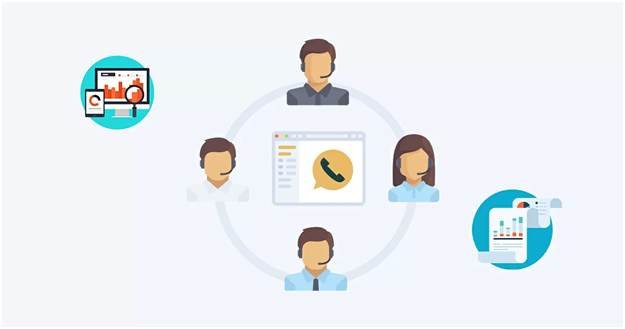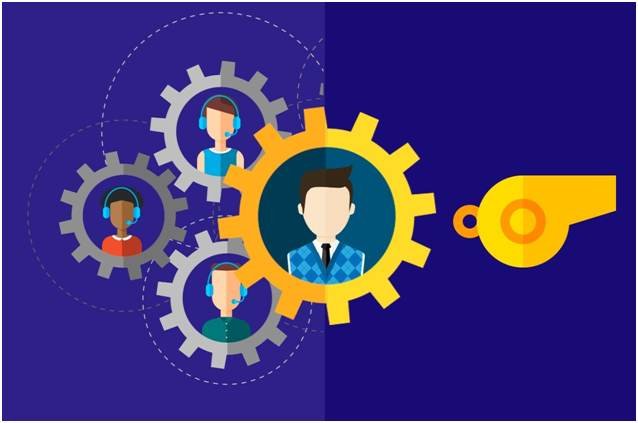Call center software is an expensive purchase. It’s not just about the money; setting up a new platform takes time and can drastically change how you communicate with customers.
That means a lot is riding on your success! You don’t want to switch call center solution providers again in a few years because the one you chose wasn’t up to par.
So, what should you think about as you weigh your options? In this post, we’ll answer the question “what software do call centers use?” and highlight the newest features that call center software providers have incorporated into their software.
1. Call center software needs to be adaptable

Call center technology is rapidly evolving. New channels and increased customer expectations have fundamentally altered the industry’s priorities.
This means that when selecting a platform, you should ask yourself two questions:
1. What do we require right now?
2. What will we require in the future?
The call center telephony solutions you select should be adaptable enough to meet your current and future needs.
That doesn’t mean you should be up at night worrying about new technology you don’t need. And you ** should not follow every new social media trend!
So, what does this mean for your call center software selection?
It simply means that the system you choose should not hold you back when you decide that a new channel or technology is necessary.
For two reasons, No-Code platforms are among the most adaptable:
You are not restricted to a specific feature set. Instead, these tools use APIs to connect various software and technologies. When new services become available, they can be easily integrated into your existing system.
The second reason is that almost anyone can use these platforms to streamline their customer service. To make significant changes, you don’t need any programming skills. Any skilled operational brain in your company can make vita updates without needing an expensive call center solution provider development process.
2. Call center software should support automation

Automation is drastically altering call center software providers. The right processes save time and enable agents to provide more personalized customer service.
Among the most important automation used by contact centers are:
Automating data entry and call summaries reduces the amount of after-call work agents must do, increasing their availability.
Push data to agents automatically: Automatically push essential caller information to agents, such as CRM profiles or support tickets. This enables them to provide a quick and personalized experience.
Personalized call routing: This ensures that callers speak with the people best suited to assist them.
Outbound calls can be scheduled automatically by a call center solution provider based on actions taken by a customer or prospect.
What should you be on the lookout for?
Please make certain that the call center software you select allows for automation and makes it simple to automate in a creative, open-ended manner.
If the tool you choose does not support this, you will quickly become frustrated. Many businesses select a toolset that appears to meet their current needs, only to discover that their needs have changed. However, the software remains unchanged!
3. Call center software should work with other systems

When selecting a call center software, one of the most important questions is ‘how will this work with our other systems?’
Typically, the answer is ‘it will not.’
Most call center software does little or nothing to address the issue of data silos.
You can buy the most advanced platform available and still have to search your database for customer information manually. As a result, the term “interoperability” has become an unlikely buzzword in recent years. With the right solution, APIs make it simple to move data between systems.
For example, when a CRM is integrated with IVR, data can be shared to improve routing decisions.
Similarly, much of the automation we’ve already discussed would rely on one system sharing data with others.
If your software does not share, it will likely cause as many problems as it solves.
4. Call center software should be quick to deploy

As we’ve seen, call center software must be simple and provide as much automation as possible.
However, if it is difficult to implement, you may lose a large portion of the gains you made by purchasing it in the first place!
There’s no reason why a full call center software rollout should take more than 8 weeks from start to finish; more importantly, it should happen in the background, with no disruption.
Contact centers with a large technology stack may take a little longer – whether or not a significant data migration is required.
(However, the golden rule remains – disruption should be kept to a minimum!)
5. Call center software should offer training and support.

Switching to a new tool is rarely simple, and there is always a period when people are less familiar with the new software than the old. As a result, you should look for a tool that provides features such as:
- In-person instruction
- Excellent learning resources
- Technical assistance in real-time
- Self-service help
Ideally, the service will assist during the hours that your contact center is open. That way, if something goes wrong, you know someone will be there to assist you.
This is especially true for critical business operations tools, such as call center software.
Conclusion
While technology cannot completely solve today’s call center challenges, the right call center software can help. Choosing the right call center customer service solutions with omnichannel capabilities can relieve the pressure to go digital. Skills-based routing, CRM integrations, natural speech recognition, callbacks, outbound IVRs, quality management analytics, and omnichannel forecasting can improve customer experience.
Many of these features also improve agent experience and meet today’s agents’ expectations of working with modern software. Good ACDs enable agents to work from home, and omnichannel forecasting combined with good reporting can assist leaders in managing pandemic-pressured budgets.
Want to learn more about providing digital services? contact Aavaz FreePBX. Aavaz FreePBX offers call center software and cloud call center solutions tailored to your current and future business needs.


